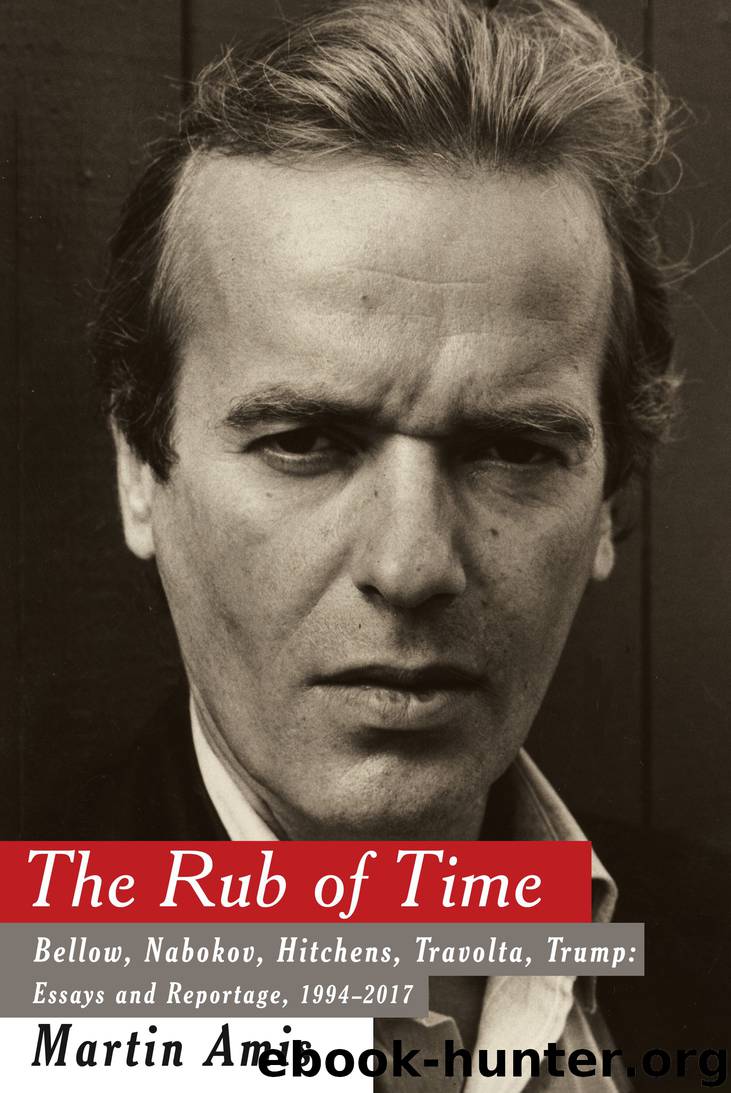The Rub of Time by Martin Amis

Author:Martin Amis
Language: eng
Format: epub
Publisher: Knopf Doubleday Publishing Group
Published: 2018-02-06T05:00:00+00:00
* * *
*
The Angel Esmeralda: Nine Stories, surprisingly, is DeLillo’s first collection. In the course of his career he has published twenty shorter fictions, so there has already been a paring down. A halving, in fact, though the book, to my eye and ear, is a faithful alternation between first- and second-echelon work—between easy-chair DeLillo and hard-chair DeLillo. The stories come in order of composition, with dates, and in three sections, each of them flagged by a quietly resonant illustration (a view of the planet from outer space, a heavily restored classical fresco, a painting of a spectral cadaver). As a package, the book feels both pointed and secretive, both airy and airtight. The arrangement holds the promise of a kind of unity, or a kind of cumulative artistic force; and the promise is honored. These nine pieces add up to something considerable, and form a vital addition to the corpus.
Three stories focus on, or at any rate include, erotic encounters, and two of them run into the additional hazards that beset this sphere. Unless sexuality is the master theme of a narrative (as in Lolita, say, or Portnoy’s Complaint), it will always feel like a departure or a parenthesis. In “Creation,” the earliest story (1979), the protagonist uses the chaos of interisland Caribbean travel to engineer an adulterous fling with another stranded passenger. The frustration, the suspension in place and time (“We’ll get the two o’clock flight, or the five, depending on our status. The important thing right now is to clarify our status”), and the sensuality of the landscape supposedly conspire to make the episode seem inevitable; but the reader’s naïve and no doubt vulgar curiosity (what for? and then what?) goes ungratified. The story feels bleached of past and future, of context and consequence.
I long ago assented to DeLillo’s unspoken premise—that fiction exaggerates the ever-weakening power of motive in human dealings. Yes, it does; but there’s a reason for that. Motive tends to provide coherence, and fiction needs things that cohere. “The Starveling” (2011, and the most recent story) gives us a middle-aged retiree named Leo Zhelezniak. Beginning at around nine in the morning, Leo spends all day, every day, in the cinemas of New York. Why? His ex-wife, Flory, with whom he cohabits, likes to speculate:
He was an ascetic, she said. This was one theory. She found something saintly and crazed in his undertaking, an element of self-denial, an element of penance….
Or he was a man escaping his past….Was he at the movies to see a movie, she said, or maybe more narrowly, more essentially, simply to be at the movies?
He thought about this.
Download
This site does not store any files on its server. We only index and link to content provided by other sites. Please contact the content providers to delete copyright contents if any and email us, we'll remove relevant links or contents immediately.
The Rules Do Not Apply by Ariel Levy(4945)
Bluets by Maggie Nelson(4535)
Too Much and Not the Mood by Durga Chew-Bose(4321)
Pre-Suasion: A Revolutionary Way to Influence and Persuade by Robert Cialdini(4198)
The Motorcycle Diaries by Ernesto Che Guevara(4075)
Walking by Henry David Thoreau(3941)
Schaum's Quick Guide to Writing Great Short Stories by Margaret Lucke(3366)
What If This Were Enough? by Heather Havrilesky(3298)
The Daily Stoic by Holiday Ryan & Hanselman Stephen(3287)
The Day I Stopped Drinking Milk by Sudha Murty(3183)
The Social Psychology of Inequality by Unknown(3010)
Why I Write by George Orwell(2935)
Letters From a Stoic by Seneca(2779)
A Short History of Nearly Everything by Bryson Bill(2678)
A Burst of Light by Audre Lorde(2583)
Insomniac City by Bill Hayes(2535)
Feel Free by Zadie Smith(2469)
Upstream by Mary Oliver(2380)
Miami by Joan Didion(2356)
